大学英语翻译教程-第七讲
- 格式:ppt
- 大小:1.32 MB
- 文档页数:43
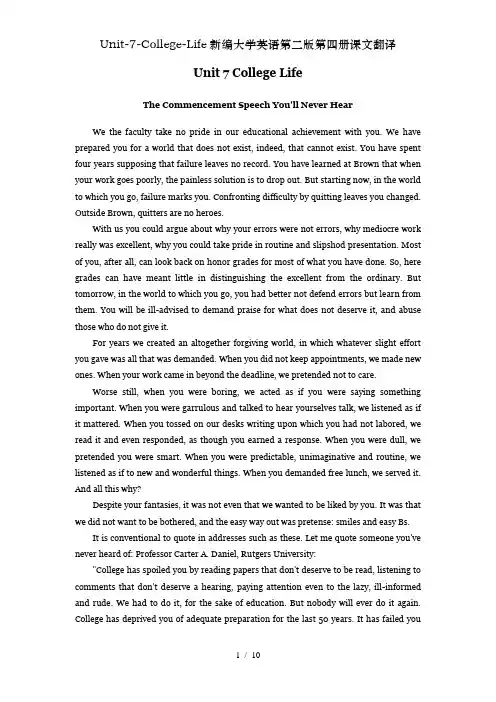
Unit 7 College LifeThe Commencement Speech You'll Never HearWe the faculty take no pride in our educational achievement with you. We have prepared you for a world that does not exist, indeed, that cannot exist. You have spent four years supposing that failure leaves no record. You have learned at Brown that when your work goes poorly, the painless solution is to drop out. But starting now, in the world to which you go, failure marks you. Confronting difficulty by quitting leaves you changed. Outside Brown, quitters are no heroes.With us you could argue about why your errors were not errors, why mediocre work really was excellent, why you could take pride in routine and slipshod presentation. Most of you, after all, can look back on honor grades for most of what you have done. So, here grades can have meant little in distinguishing the excellent from the ordinary. But tomorrow, in the world to which you go, you had better not defend errors but learn from them. You will be ill-advised to demand praise for what does not deserve it, and abuse those who do not give it.For years we created an altogether forgiving world, in which whatever slight effort you gave was all that was demanded. When you did not keep appointments, we made new ones. When your work came in beyond the deadline, we pretended not to care.Worse still, when you were boring, we acted as if you were saying something important. When you were garrulous and talked to hear yourselves talk, we listened as if it mattered. When you tossed on our desks writing upon which you had not labored, we read it and even responded, as though you earned a response. When you were dull, we pretended you were smart. When you were predictable, unimaginative and routine, we listened as if to new and wonderful things. When you demanded free lunch, we served it. And all this why?Despite your fantasies, it was not even that we wanted to be liked by you. It was that we did not want to be bothered, and the easy way out was pretense: smiles and easy Bs.It is conventional to quote in addresses such as these. Let me quote someone you've never heard of: Professor Carter A. Daniel, Rutgers University:"College has spoiled you by reading papers that don't deserve to be read, listening to comments that don't deserve a hearing, paying attention even to the lazy, ill-informed and rude. We had to do it, for the sake of education. But nobody will ever do it again. College has deprived you of adequate preparation for the last 50 years. It has failed youby being easy, free, forgiving, attentive, comfortable, interesting, unchallenging fun. Good luck tomorrow.That is why, on this commencement day, we have nothing in which to take much pride.Oh, yes, there is one more thing. Try not to act toward your co-workers and bosses as you have acted toward us. I mean, when they give you what you want but have not earned, don't abuse them, insult them, act out with them your parlous relationships with your parents. This too we have tolerated. It was, as I said, not to be liked. Few professors actually care whether or not they are liked by peer-paralyzed adolescents, fools so shallow as to imagine professors care not about education but about popularity. It was, again, to be rid of you. So go, unlearn the lies we taught you. To life!你将永远不会听到的毕业演讲1 我们这些教师对于在你们身上取得的教育成就一点都不感到自豪。
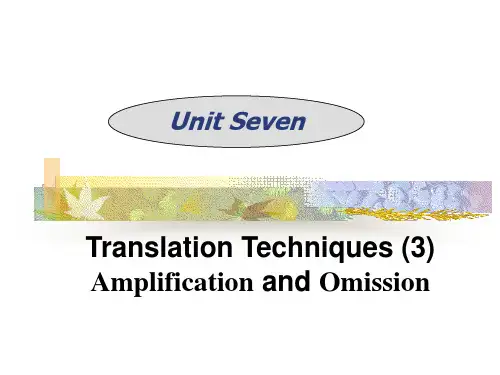
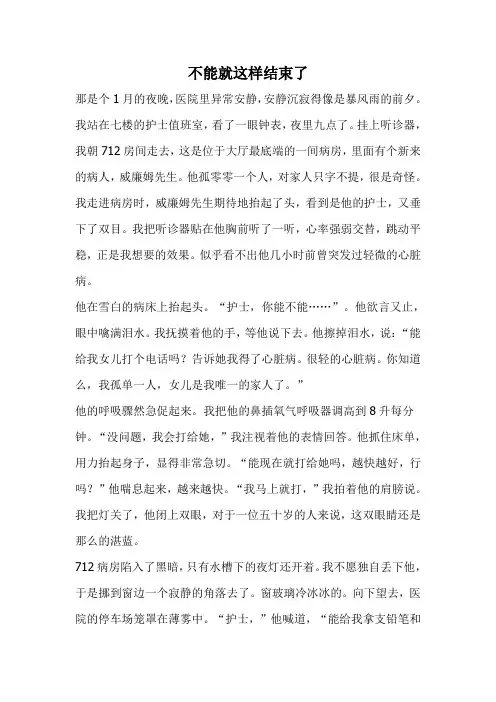
不能就这样结束了那是个1月的夜晚,医院里异常安静,安静沉寂得像是暴风雨的前夕。
我站在七楼的护士值班室,看了一眼钟表,夜里九点了。
挂上听诊器,我朝712房间走去,这是位于大厅最底端的一间病房,里面有个新来的病人,威廉姆先生。
他孤零零一个人,对家人只字不提,很是奇怪。
我走进病房时,威廉姆先生期待地抬起了头,看到是他的护士,又垂下了双目。
我把听诊器贴在他胸前听了一听,心率强弱交替,跳动平稳,正是我想要的效果。
似乎看不出他几小时前曾突发过轻微的心脏病。
他在雪白的病床上抬起头。
“护士,你能不能……”。
他欲言又止,眼中噙满泪水。
我抚摸着他的手,等他说下去。
他擦掉泪水,说:“能给我女儿打个电话吗?告诉她我得了心脏病。
很轻的心脏病。
你知道么,我孤单一人,女儿是我唯一的家人了。
”他的呼吸骤然急促起来。
我把他的鼻插氧气呼吸器调高到8升每分钟。
“没问题,我会打给她,”我注视着他的表情回答。
他抓住床单,用力抬起身子,显得非常急切。
“能现在就打给她吗,越快越好,行吗?”他喘息起来,越来越快。
“我马上就打,”我拍着他的肩膀说。
我把灯关了,他闭上双眼,对于一位五十岁的人来说,这双眼睛还是那么的湛蓝。
712病房陷入了黑暗,只有水槽下的夜灯还开着。
我不愿独自丢下他,于是挪到窗边一个寂静的角落去了。
窗玻璃冷冰冰的。
向下望去,医院的停车场笼罩在薄雾中。
“护士,”他喊道,“能给我拿支铅笔和一张纸吗?”我拿来一张黄色的小纸片,从兜里掏出一支钢笔,放在了他的床头柜上。
我走回了护士值班室,坐在电话旁。
威廉姆先生的女儿是他资料表上的第一联系人。
我从问讯处查到她的号码,打了过去。
她回答的声音很温柔。
“珍妮,我是医院值班护士凯蒂。
我是替你父亲打来的。
今晚他患了轻度的心脏病入院了,他……”“什么!”她在电话里尖叫起来,吓了我一跳。
“他不会快要死了吧?”“他目前病情稳定,”我说,语气尽量听起来让她感到宽慰。
接下来一阵沉默。
“你千万不能让他死!”她说。
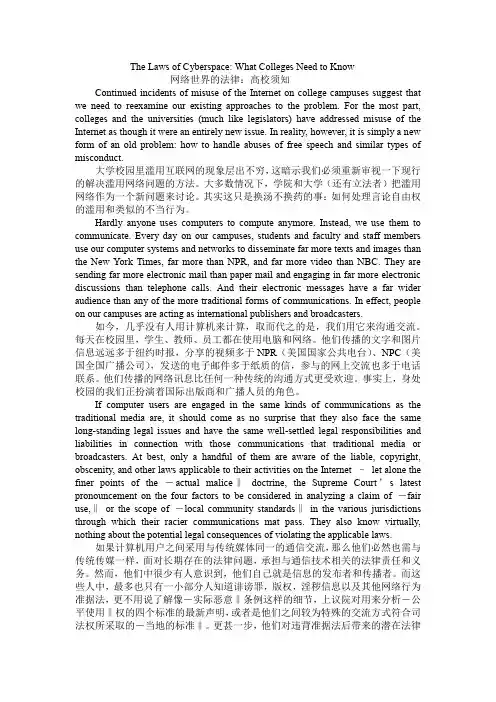
The Laws of Cyberspace: What Colleges Need to Know网络世界的法律:高校须知Continued incidents of misuse of the Internet on college campuses suggest that we need to reexamine our existing approaches to the problem. For the most part, colleges and the universities (much like legislators) have addressed misuse of the Internet as though it were an entirely new issue. In reality, however, it is simply a new form of an old problem: how to handle abuses of free speech and similar types of misconduct.大学校园里滥用互联网的现象层出不穷,这暗示我们必须重新审视一下现行的解决滥用网络问题的方法。
大多数情况下,学院和大学(还有立法者)把滥用网络作为一个新问题来讨论。
其实这只是换汤不换药的事:如何处理言论自由权的滥用和类似的不当行为。
Hardly anyone uses computers to compute anymore. Instead, we use them to communicate. Every day on our campuses, students and faculty and staff members use our computer systems and networks to disseminate far more texts and images than the New York Times, far more than NPR, and far more video than NBC. They are sending far more electronic mail than paper mail and engaging in far more electronic discussions than telephone calls. And their electronic messages have a far wider audience than any of the more traditional forms of communications. In effect, people on our campuses are acting as international publishers and broadcasters.如今,几乎没有人用计算机来计算,取而代之的是,我们用它来沟通交流。
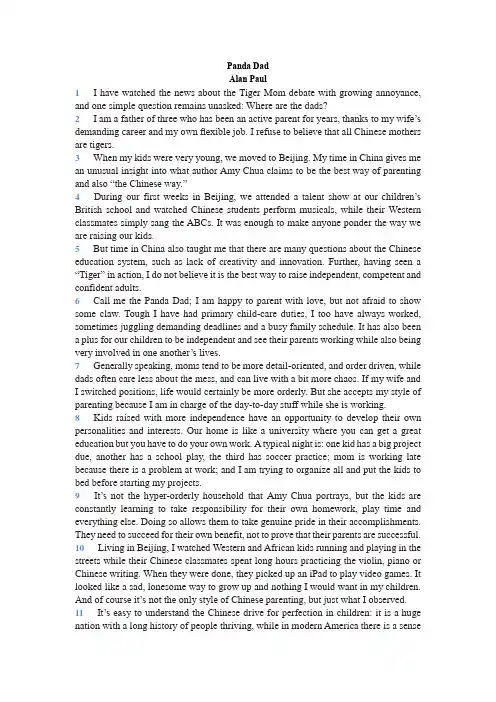
Panda DadAlan Paul1 I have watched the news about the Tiger Mom debate with growing annoyance, and one simple question remains unasked:Where are the dads?2 I am a father of three who has been an active parent for years,thanks to my wife’s demanding career and my own flexible job. I refuse to believe that all Chinese mothers are tigers.3 When my kids were very young, we moved to Beijing. My time in China gives me an unusual insight into what author Amy Chua claims to be the best way of parenting and also “the Chinese way.”4 During our first weeks in Beijing, we attended a talent show at our children’s British school and watched Chinese students perform musicals, while their Western classmates simply sang the ABCs. It was enough to make anyone ponder the way we are raising our kids.5 But time in China also taught me that there are many questions about the Chinese education system, such as lack of creativity and innovation. Further,having seen a “Tiger” in action, I do not believe it is the best way to raise independent, competent and confident adults.6 Call me the Panda Dad; I am happy to parent with love, but not afraid to show some claw. Tough I have had primary child-care duties, I too have always worked, sometimes juggling demanding deadlines and a busy family schedule.It has also been a plus for our children to be independent and see their parents working while also being very involved in one another’s lives.7 Generally speaking, moms tend to be more detail-oriented, and order driven, while dads often care less about the mess, and can live with a bit more chaos. If my wife and I switched positions, life would certainly be more orderly. But she accepts my style of parenting because I am in charge of the day-to-day stuff while she is working.8 Kids raised with more independence have an opportunity to develop their own personalities and interests. Our home is like a university where you can get a great education but you have to do your own work. A typical night is: one kid has a big project due, another has a school play, the third has soccer practice;mom is working late because there is a problem at work; and I am trying to organize all and put the kids to bed before starting my projects.9 It’s not the hyper-orderly household that Amy Chua portrays, but the kids are constantly learning to take responsibility for their own homework, play time and everything else. Doing so allows them to take genuine pride in their accomplishments. They need to succeed for their own benefit, not to prove that their parents are successful.10 Living in Beijing, I watched Western and African kids running and playing in the streets while their Chinese classmates spent long hours practicing the violin, piano or Chinese writing. When they were done, they picked up an iPad to play video games. It looked like a sad, lonesome way to grow up and nothing I would want in my children. And of course it’s not the only style of Chinese parenting, but just what I observed.11 It’s easy to understand the Chi nese drive for perfection in children: it is a huge nation with a long history of people thriving, while in modern America there is a sensethat our nation is becoming flat and that people are not trying to better themselves.12 It’s understandable to dem and perfection, but it is wrong to force a child to constantly adapt to your standards and to be overprotective. Also not allowing play time or sleeping at friends’ houses brings on more isolation. T his will deny them the ability to make friends and interact. These are the very skills that kids should learn for success as a functioning adult. They are far more important than being able to play the piano. Kids need more unstructured play, not less.13 Sleepovers help children learn to sleep anywhere, in any bed, and with any pillow. They learn the life of their friends and have the chance to play more with friends.14 I, Panda Dad, suggest that you change your way of thinking that you can pick your children’s friends, interests and musical passions. T herefore, they will grow up to be highly functioning, independent, self-confident young Chinese boys or girls.15 And so will society.熊猫爸艾伦•保罗有关“虎妈”论战的新闻,我是越看越恼火,而且,有一个很简单的问题一直没有提及:爸爸们在哪呢?我是三个孩子的父亲。
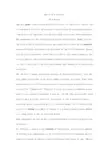
How to be a scientistG ina KolataA sk most people– even students majoring in science – to describe the typical life of a successful scientist, and chances are they will describe a dedicated existence: long hours in the laboratory, toiling alone among racks of test tubes and beakers.B ut researchers say that nothing could be further from the truth. I ndeed, they say, the irony is that to succeed in science, most people have to leave the lab completely. L eading biologists and chemists say they spend no time in the laboratory. I nstead they write grant proposals, travel and give talks on their group‟s research; they think up ideas for their staff of graduate students and postdoctoral fellows to work on, and try their best to motivate and encourage staff members to be creative and productive.D r. Shirley, Tilghman, a molecular biologist at Princeton University, says that most people have no idea of the skills needed to succeed in science. “I get these undergraduates in my office saying they are trying to decide between medicine and science,” Dr. Tilghman said. “They say, …I really want to go into medicine because I want to be involved with people.‟I just say, …my God.‟ The extraordinary thing about being a principal scientific investigator is that I should have been a psychology major. I do nothing but try to motivate people, try to figure out why they‟re not working hard. M ost of biology is a profession where success depends to a large extent on how you work with people.”S ome researchers say that the most valuable course work for scientists may not even be science.Dr. Ponzy Lu, a chemist at the University of Pennsylvania, says his worst memories of his days as an undergraduate at the California Institute of Technology were the humanities courses he and every other science major were forced to take. “We hadto write 500 to 1,000 words a week in essays,” Dr. Lu said. “I wasn‟t good at that kind of stuff.”But as soon as he become a successful scientist, Dr. Lu said he found that rather than puttering around the laboratory conducting experiments, he had to spend his time writing grant proposals, meeting deadlines. Dr. Lu said, writing “is about all I do.”A nd the dreaded essay writing at Cal Tech was “the most useful thing I learned.”S ome scientist s are delighted to leave the laboratory and find that they can finally shine when they are judged by their ideas and their administrative skills. Y et even people who feel this way are often loath to admit it, Dr. Lu said, because it is part of the mystique of science to say you love the lab. “It‟s like Jimmy Carter saying he lusted after women,” Dr. Lu said. “You can get in a lot of trouble saying things like that.”B ut no matter what they think of laboratory work, most researchers say that it was not until they were in graduate school, well on their way to becoming scientists, that they realized what the career path actually is.Dr. Kenneth Gross, a molecular geneticist at Roswell Park Cancer Institute in Buffalo, N.Y., remembers well his epiphany. I t happened when he was a graduate student at the Massachusetts Institute of Technology. O ne day, Dr. Gross was working happily in the lab next to a postdoctoral fellow, Dr. Arthur Skoultchi, who is now at Albert Einstein College of Medicine. F ull of enthusiasm, Dr. Gross said, he remarked that “the most incredible thing is that hey paid you to work in a lab.” Dr. Skoultchi, he said, replied, “Enjoy it while you can,”and explained to Dr. Gross what lay ahead. Y oung scientists move up the ladder from graduate student to postdoctoral fellow to assistant professor to, they hope, recipient of a federal grant. F rom then on, their time in the lab rapidly dwindles to nothing.Dr. Lu explained that it was not so surprising that most successful scientists ended up as thinkers rather than doers. “That‟s the whole problem with big science,” he said. “You have to have an army of people to do the work.”B ut, he added, “Part of what makes a person become a scientist is the desire for influence and power. A nd the only way you can have that is to have a group of people working on your ideas.”A typical research group at a leading university has about a dozen people, paid for mainly by grant money either from the federal government, private groups like the American Cancer Society or companies, that the principal investigator raises.D r. Lu said that although his salary is paid by the university, he must bring in $300,000 a year to run his lab. T his includes paying for equipment and paying the budding scientists who perform the experiments. Graduate students earn about $12,000 a year, some of which, is paid by fellowship; the rest comes from grant money. P ostdoctoral fellows receive about $20,000 a year.S ome scientist s run huge groups that have budgets equal to those of small corporations.D r. Jerome Groopman, an AIDS researcher at Brigham and Women‟s Hospital in Boston, said his group of about 50 people had an operating budget of $2 million a year.“It‟s clearly a major problem for a lot of people,”said Dr. Tom Maniatis, a molecular biologist at Harvard. “Nowhere in your education are you trained to be a manager or administer. S uddenly you are faced with writing grants and keeping track of spending. B ut the most difficult challenge is managing people. I don‟t think scientist s are prepared to do that at all.”From the new york times , april 4,1993.怎样成为一名科学家问大多数人- 即使在科学专业的学生- 来形容一个成功的科学家的典型生活,和机会,他们将在实验室中描述了一个专用的存在:时间长,独自之间的试管和烧杯架劳作。
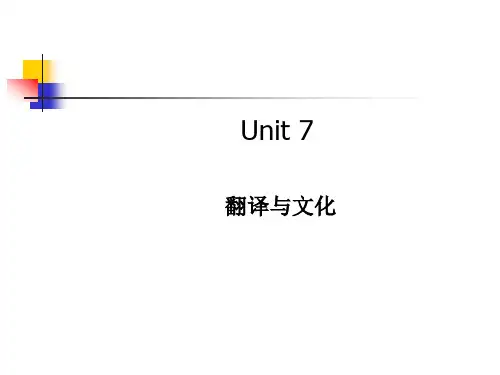
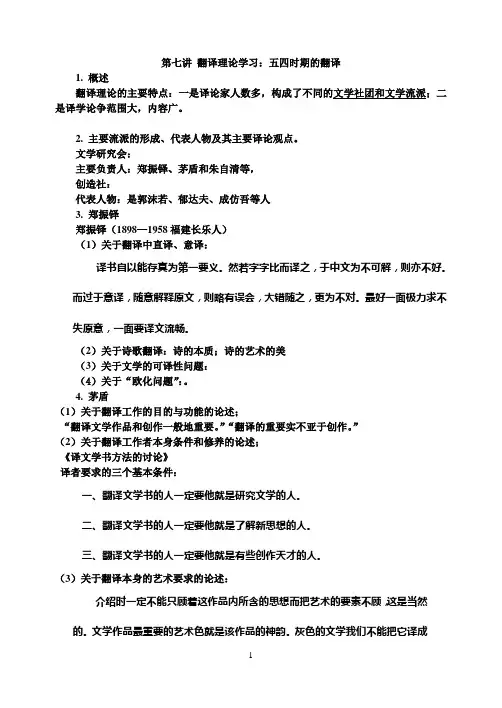
第七讲翻译理论学习:五四时期的翻译1. 概述翻译理论的主要特点:一是译论家人数多,构成了不同的文学社团和文学流派;二是译学论争范围大,内容广。
2. 主要流派的形成、代表人物及其主要译论观点。
文学研究会:主要负责人:郑振铎、茅盾和朱自清等,创造社:代表人物:是郭沫若、郁达夫、成仿吾等人3. 郑振铎郑振铎(1898—1958福建长乐人)(1)关于翻译中直译、意译:译书自以能存真为第一要义。
然若字字比而译之,于中文为不可解,则亦不好。
而过于意译,随意解释原文,则略有误会,大错随之,更为不对。
最好一面极力求不失原意,一面要译文流畅。
(2)关于诗歌翻译:诗的本质;诗的艺术的美(3)关于文学的可译性问题:(4)关于“欧化问题”:。
4. 茅盾(1)关于翻译工作的目的与功能的论述;“翻译文学作品和创作一般地重要。
”“翻译的重要实不亚于创作。
”(2)关于翻译工作者本身条件和修养的论述;《译文学书方法的讨论》译者要求的三个基本条件:一、翻译文学书的人一定要他就是研究文学的人。
二、翻译文学书的人一定要他就是了解新思想的人。
三、翻译文学书的人一定要他就是有些创作天才的人。
(3)关于翻译本身的艺术要求的论述:介绍时一定不能只顾着这作品内所含的思想而把艺术的要素不顾,这是当然的。
文学作品最重要的艺术色就是该作品的神韵。
灰色的文学我们不能把它译成红色;神秘而带颓废气的文学我们不能把它译成光明而矫健的文学。
5. 鲁迅(1)关于翻译的目的与宗旨;(2)关于“直译”与“硬译”;(3)关于翻译的言语、句法问题;(4)关于重译(转译)和复译问题;(5)关于翻译批评问题。
翻译技巧学习:否定的翻译(一)一、全部否定no,none,not,never, nobody,nothing,nowhere, neither…nor等。
(1)Nowadays it is not difficult to go abroad.现如今出国并不难。
(2)The boy was nowhere to be found.到处都找不到那个男孩。
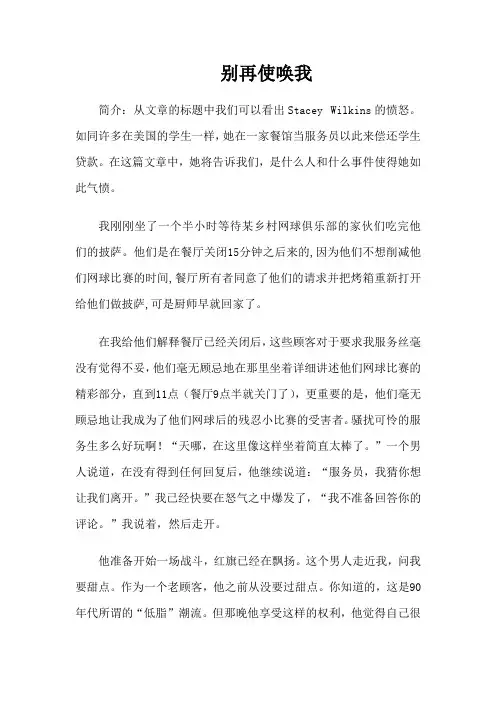
别再使唤我简介:从文章的标题中我们可以看出Stacey Wilkins的愤怒。
如同许多在美国的学生一样,她在一家餐馆当服务员以此来偿还学生贷款。
在这篇文章中,她将告诉我们,是什么人和什么事件使得她如此气愤。
我刚刚坐了一个半小时等待某乡村网球俱乐部的家伙们吃完他们的披萨。
他们是在餐厅关闭15分钟之后来的,因为他们不想削减他们网球比赛的时间,餐厅所有者同意了他们的请求并把烤箱重新打开给他们做披萨,可是厨师早就回家了。
在我给他们解释餐厅已经关闭后,这些顾客对于要求我服务丝毫没有觉得不妥,他们毫无顾忌地在那里坐着详细讲述他们网球比赛的精彩部分,直到11点(餐厅9点半就关门了),更重要的是,他们毫无顾忌地让我成为了他们网球后的残忍小比赛的受害者。
骚扰可怜的服务生多么好玩啊!“天哪,在这里像这样坐着简直太棒了。
”一个男人说道,在没有得到任何回复后,他继续说道:“服务员,我猜你想让我们离开。
”我已经快要在怒气之中爆发了,“我不准备回答你的评论。
”我说着,然后走开。
他准备开始一场战斗,红旗已经在飘扬。
这个男人走近我,问我要甜点。
作为一个老顾客,他之前从没要过甜点。
你知道的,这是90年代所谓的“低脂”潮流。
但那晚他享受这样的权利,他觉得自己很强大,而我觉得自己被侵犯了。
接受了3美元20美分之后,我回家了。
他们的小费是我为这场精神强奸付出的代价。
开车时,眼泪从我的脸上滑落,我为什么在哭?我之前也被骚扰过,10年的服务员生涯本应该让我对这种情况变得无动于衷,但,这是一个转折点:十年侮辱的最终结果。
我现在处于一个爆发点上,我不能忍受作为一个公众的情绪发泄包,人们似乎认为侮辱服务员是被包含在餐费里的,所有的正派和礼貌都放在了挂在门上的外套里。
他们认为自己的地位远高于我的,他们是国王,而我是农夫。
我宁愿他们成为农夫。
在美国,我是餐厅义务服务的极力倡导者。
连干两班活将是对压迫者的最好的教训,让他们上酒菜,让他们打扫在孩子玩耍后的战场,以及让他们在某个10个人的聚会占了他们的桌子三个小时后只给了一点点小费而变得沮丧。
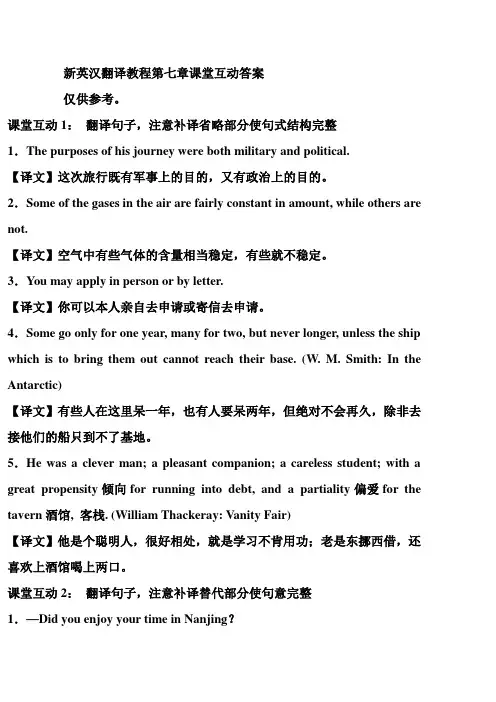
新英汉翻译教程第七章课堂互动答案仅供参考。
课堂互动1:翻译句子,注意补译省略部分使句式结构完整1.The purposes of his journey were both military and political.【译文】这次旅行既有军事上的目的,又有政治上的目的。
2.Some of the gases in the air are fairly constant in amount, while others are not.【译文】空气中有些气体的含量相当稳定,有些就不稳定。
3.You may apply in person or by letter.【译文】你可以本人亲自去申请或寄信去申请。
4.Some go only for one year, many for two, but never longer, unless the ship which is to bring them out cannot reach their base. (W. M. Smith: In the Antarctic)【译文】有些人在这里呆一年,也有人要呆两年,但绝对不会再久,除非去接他们的船只到不了基地。
5.He was a clever man; a pleasant companion; a careless student; with a great propensity倾向for running into debt, and a partiality偏爱for the tavern酒馆, 客栈. (William Thackeray: Vanity Fair)【译文】他是个聪明人,很好相处,就是学习不肯用功;老是东挪西借,还喜欢上酒馆喝上两口。
课堂互动2:翻译句子,注意补译替代部分使句意完整1.—Did you enjoy your time in Nanjing?—Yes, I did.【译文】——你在南京过得愉快吗?——是的,我过得很愉快。
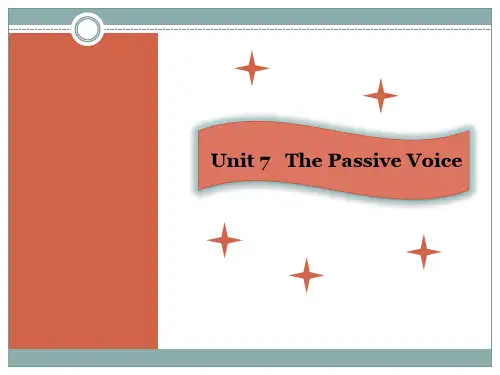
保护1瑟伦要去日本学木工手艺,临走前他问我能否收留他的狗霍根。
我说:“当然可以,它可以保护我。
”最近我们家附近常有抢劫案发生,我在马萨诸塞州的房子北面靠湖,西面被树林环绕,晚上坏人可以神不知鬼不觉地溜进来。
2瑟伦哈哈大笑。
他说:“有陌生人进门时,霍根也不一定会叫。
如果来了个夜贼,他或许还会去舔他。
”3不过,霍根感觉到他跟我的关系与他跟瑟伦的关系有所不同。
瑟伦体格强壮,而且相对来说比较勇敢,他并不需要太多的保护。
匆忙赶路时,瑟伦会像抱小孩那样一下子把霍根抱到皮卡的货箱上。
我可抱不动他,我的体重和霍根差不多,而且他还比我年轻力壮。
作为女人,我所面临的危险是瑟伦和霍根根本不可能知道的。
在我这里生活了一周之后,只要一有陌生人靠近家门,霍根就开始吠叫。
4我们间的保护关系其实早就存在了,起初我是保护者。
瑟伦第一次把霍根托付给我看管时,他还只是一只七个月大的小狗,他只在我家里过了一个周末。
那是11月底一个寒冷的早晨,湖水刚开始结冰。
湖面上的一层薄冰能托得住吹落的树叶和细小的树枝,但是还太脆弱,远不能承受动物的爪子。
5那时我正在后院晾衣服,长长的晒衣绳拴在房子旁的一棵参天橡树和湖边的一棵云杉之间。
一条淡蓝色的床单随风飘起,眼看着就要掠过湖面飞上天空。
当我奋力地用衣服夹子夹床单时,霍根正在我腿边玩得气喘嘘嘘,一段两英尺长的橡树枝成了他的宝贝,被他叼来叼去。
6由于一心只想着揪住床单,让它平整伏贴地悬挂在晒衣绳上,我心不在焉地捡起那段树枝,朝山坡下将我们家院子与湖水隔开的围栏方向扔了过去。
7我以前也经常这样为他扔木头。
根据木头的重量和我动作的大小,我知道它们大概能飞多远。
但这块木头赶上了一阵疾风,朝着床单想去的方向飞过了院子,越过了围栏,最后以溜冰高手般的优美动作滑进湖水里。
我抬头一看,只见霍根飞速穿过院门,以一个漂亮的飞跃撞破薄冰落入水中,他差一点就够得着那段木头了。
8时间凝固了,我站在晒衣绳边,心想:瑟伦把这孩子交给我看管,他可是我的第一个孙子,我必须救他。
大学英语翻译教程COLLEGE ENGLISH TRANSLATION COURSE大学英语翻译教程目录绪论易学难精话翻译第一单元词的选择翻译短文段和段律师事务所的创建词汇提示难点解析参考译文翻译技巧词的选择课外练习翻译欣赏第二单元词的增补翻译短文理解魔鬼词汇提示难点解析参考译文翻译技巧词的增补课外练习翻译欣赏第三单元词的省略翻译短文运动员的情操词汇提示难点解析参考译文翻译技巧词的省略课外练习第四单元词类的转换翻译短文手机商面临新的肿瘤诉讼案词汇提示难点解析参考译文翻译技巧词类的转换课外练习翻译欣赏第五单元虚词的翻译翻译短文重视精神健康词汇提示难点解析参考译文翻译技巧虚词的翻译课外练习翻译欣赏第六单元比喻性词语的翻译翻译短文银元词汇提示难点解析参考译文翻译技巧比喻性词语的翻译课外练习翻译欣赏第七单元连动式和兼语式的翻译翻译短文反腐败词汇提示难点解析参考译文翻译技巧连动式与兼语式的翻译翻译欣赏第八单元无主句的翻译翻译短文经济建设与经济体制改革词汇提示难点解析参考译文翻译技巧无主句的翻译课外练习翻译欣赏第九单元语态的转换翻译短文中国面临新挑战词汇提示难点解析参考译文翻译技巧语态的转换课外练习翻译欣赏第十单元否定的翻译翻译短文我所追求的幸福词汇提示难点解析参考译文翻译技巧否定的翻译课外练习翻译欣赏第十一单元四字词组的翻译翻译短文正视失意词汇提示难点解析参考译文翻译技巧四字词组的翻译课外练习翻译欣赏第十二单元“把”字句的翻译翻译短文贷款消费时代的到来词汇提示难点解析参考译文翻译技巧“把”字句的翻译课外练习翻译欣赏第十三单元“是”字句的翻译翻译短文工商管理硕士词汇提示难点解析参考译文翻译技巧“是”字句的翻译课外练习翻译欣赏第十四单元长句的翻译翻译短文何时会在中国人的土地上出现获诺贝尔奖的作业?词汇提示难点解析参考译文翻译技巧长句的翻译课外练习翻译欣赏第十五单元数量词的翻译翻译短文彩票词汇提示难点解析参考译文翻译技巧数量词的翻译课外练习翻译欣赏第十六单元科技文本的翻译翻译短文了解什么是多媒体词汇提示难点解析参考译文翻译技巧科技文本的翻译课外练习翻译欣赏第十七单元新闻文本的翻译翻译短文布莱尔会见李肇星词汇提示难点解析参考译文翻译技巧新闻文本的翻译课外练习翻译欣赏第十八单元旅游文本的翻译翻译短文泰山词汇提示难点解析参考译文翻译技巧旅游文本的翻译课外练习翻译欣赏第十九单元广告文本的翻译翻译短文阴阳健身球词汇提示难点解析参考译文翻译技巧广告文本的翻译课外练习翻译欣赏第二十单元其他实用文本的翻译翻译短文其他应用文的翻译词汇提示难点解析参考译文翻译技巧概述商务信函338课外练习翻译欣赏练习参考答案绪论易学难精话翻译曾经以为“一个人要学好一门外国语就必须首先忘记本族语”,在经历了“学,然后知不足;教,然后知困”才明白,马克思先生的这一主张不仅不符合中国国情,连“普遍原理”都算不上。